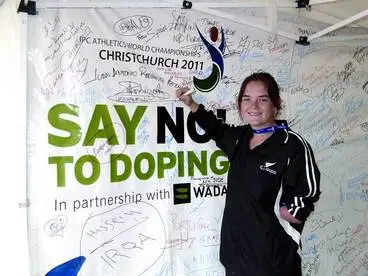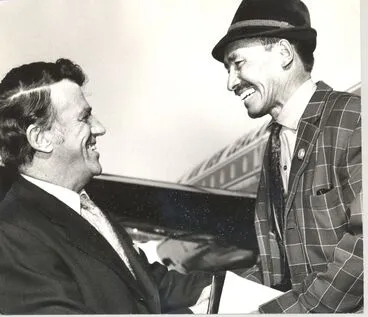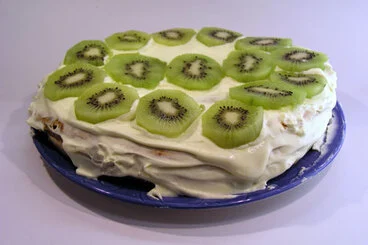New Zealand Sport
A DigitalNZ Story by National Library of New Zealand Topics
Many New Zealand sportsmen and sportswomen have achieved world records. This resource covers history of sport, types of sports, including funding, rules, laws, sexism, drugs in sports, Māori sports, international games and the value of sport in Aotearoa. SCIS no: 1922227
Winners of the women's 80-metres hurdles, 1950 British Empire Games, Eden Park, Auckland
Alexander Turnbull Library
Commonwealth Games
National Library of New Zealand
New Zealand as the Commonwealth Games host
Manatū Taonga, the Ministry for Culture and Heritage
New Zealand Olympic and Commonwealth Games athletes
Services to Schools
America's Cup, San Francisco, 2013
Manatū Taonga, the Ministry for Culture and Heritage
The sailing collection
Services to Schools
America's Cup
DigitalNZ
Everything you need to know about the 36th America’s Cup
Services to Schools
New Zealand cricket: The World Cup a brief history
Services to Schools
Israel Folau loses contract
Services to Schools
Holly Robinson supporting Drug Free Sport New Zealand
Manatū Taonga, the Ministry for Culture and Heritage
Olympians
DigitalNZ
Sports and games in traditional Māori society
Manatū Taonga, the Ministry for Culture and Heritage
Sports writing
Manatū Taonga, the Ministry for Culture and Heritage
The role of sports brands in niche sport subcultures
Auckland University of Technology
New approach reveals high sector value
Lincoln University
Chasing Great
NZ On Screen
Women's worth and sexism in sport
Radio New Zealand
Māori rugby timeline - Māori rugby timeline
Manatū Taonga, the Ministry for Culture and Heritage
Obstacles to Action - A Study of New Zealanders' Physical Activity and Nutrition
Social Investment Agency
Ban of alcohol advertising and sponsorship in sport
Radio New Zealand
School Kids PE Gear - how much?
Radio New Zealand
London 2012 Paralympic Games
AttitudeLive
Concussion injury guidelines for sports
Radio New Zealand
[mass marathon]
Museum of New Zealand Te Papa Tongarewa
Cartoon of the Oxford v Cambridge sports
Alexander Turnbull Library
Smith, Hayden James, 1976- :Calf worship. 14 August 2013
Alexander Turnbull Library
John Knowles: from the newsroom to sports boss…
NZ On Screen
Military and sport overview
Manatū Taonga, the Ministry for Culture and Heritage
Clark, Laurence 1949- :[Line-out]. New Zealand Herald, 9 June 1993.
Alexander Turnbull Library
All Black rugby legend Sir Colin Meads dies
Alexander Turnbull Library
Māori and sport in the 19th century
Manatū Taonga, the Ministry for Culture and Heritage
Rugby World Cup hype buries Lydia Ko
Alexander Turnbull Library
The Eternal Olympics: The Art and History of Sport
University of Otago
Events in cricketing history
Services to Schools
Water activities
Services to Schools
Rugby league and rugby union
Services to Schools
Food companies and sports sponsorship
Services to Schools
History of the Silver Ferns
Services to Schools
Nutrition advice sheets
Services to Schools
Choosing dietary supplements
Services to Schools
Courage and class
Services to Schools
Pathway for Paralympics New Zealand
Services to Schools
Women and girls in sport and active recreation
Services to Schools
Sport New Zealand
Services to Schools
Sports Tribunal of New Zealand
Services to Schools
Drug Free Sport New Zealand
Services to Schools
New Zealand Sports Drug Agency Act 1994
Services to Schools
Athletics New Zealand publications
Services to Schools
Hunting in New Zealand
Services to Schools
New Zealand Sports Hall of Fame
Services to Schools
Sport and recreation injuries and prevention
Services to Schools
Injury-free sports and recreation
Services to Schools
The significance of the silver fern
Services to Schools
Coast to Coast
Services to Schools
New Zealand sport
Services to Schools
What is New Zealand’s oldest sport
Services to Schools
Sport in New Zealand
Services to Schools
Why are the All Blacks so good?
Services to Schools
Beatrice Faumuina
For its size, New Zealand has a proud tradition of international success in both the Commonwealth and Summer Olympic Games. This cartoon shows champion discus thrower, Beatrice Faumuina who won gold at the 1998 and 2002 Commonwealth Games. She has also competed in three Summer Olympics. The popularity of the Summer Olympic Games can be gauged by New Zealand viewership figures for the last games. The free-to-air screening was viewed by over 80 percent of New Zealanders aged five and up – that’s over three million Kiwis!
Alexander Turnbull Library
Maori horse racing programme
“Persons allowed to see these races must not say rude words to the stewards, or swear at jockeys who do not win” These two rules found on this early race meeting programme. From the beginning of European settlement, horse racing was a popular and important social event for both Māori and Pakeha. Some of the earliest races were held in the early 1840s along the Petone beach and in Wellington on the Te Aro flat, where it was reported that a Mr Ludlan had erected a grandstand in his garden to view the race! Today the only Māori racing club left in New Zealand is the Otaki-Māori Racing Club, which continues to run race meetings.
Alexander Turnbull Library
P-class yachting
Given New Zealander’s accessibility to the coast, it is hardly surprising that yachting has proved to be an enduring New Zealand pastime – and a sport in which we excel internationally. The yachts in this photograph are P-class. This Kiwi designed yacht has proved popular with the young and teenage sailors. It has also helped launch the careers of internationally recognised sailors like Sir Peter Blake, Russell Coutts and Dean Barker. Here P-class yachts are being launched at Seaview in Wellington harbour.
Alexander Turnbull Library
Big game fishing
Given our abundant rivers, lakes and extensive coastline it’s no wonder that recreational fishing is one of our most popular pastimes. In fact, fishing emerges as the most popular participation sport in a Horizons Research survey, with 26 per cent of people claiming they regularly cast a line. This poster from New Zealand’s Tourism Department advertises salmon, trout and big game fishing. The salmon fishing season runs from January to April and the trout from January to the end of April. A fishing licence is needed to catch both salmon and trout.
Alexander Turnbull Library
Women at Trentham racecourse
In its hey-day, the one female fashion item that featured at 1950s horse racing meetings was the frock or mid-calf length full skirt dress, sometimes – like here – accompanied with gloves, hat and pearls. Puffed out by stiff crinoline petticoats they made a glamorous fashion statement, especially after the frugal 1940s. Although out of fashion now this style of dress (and petticoat) is still worn by female rock and roll dancing enthusiasts.
Alexander Turnbull Library
Ted Morgan
Ted Morgan proudly displays the championship belt that he won as an amateur world welterweight boxing champion at the Amsterdam Olympic Games in 1928. Although selected as a lightweight, he had to box in the welterweight at the games because of the weight he had put on during the voyage to the games. A plumber by trade, Ted’s potential for boxing was discovered when he was in Wellington College. He fought 26 professional bouts, of which he won 13, lost 11 and drew two. He lost only two amateur contests. Ted Morgan will always be remembered in sporting history as the first New Zealander to win an Olympic gold medal.
Alexander Turnbull Library
Wild pig hunting
Kunekune, Arapawa and Captain Cookers were types of pigs introduced to New Zealand by early European settlers. Those that became feral were hunted for food, sport or because they destroyed crops and killed lambs. Pigs can be very dangerous, as Logan Atkinson found out when he went pig hunting with his brother in 1981. They shot a sow looking after her litter. The boys then went to catch the piglets, but a large boar chased Logan up a tree. The incident ended with Atkinson being badly wounded and taken to Palmerston Hospital.
National Library of New Zealand
"Doping? Not us!"
In this cartoon, a little kiwi says that doping in sport is a Russian thing. The reference is to Russia being banned by the International Olympic Committee from taking part in the Winter Olympics held in February 2018 in Pyeongchang, South Korea. A whistleblowing Russian doctor alleged that Russia ran a programme of doping, where he had created substances to enhance athletes’ performances. This was during the 2014 Winter Olympic Games hosted by Russia in Sochi. An investigation by the World Anti-Doping Agency (WADA) revealed that hundreds of Russian athletes had benefitted from the doping programme. IOC president called this ‘an unprecedented attack on the integrity of the Olympics’.
Alexander Turnbull Library
Hunting trophies
Mr V E Donald sits in his dining room with his trophy wall decorated with deer and wapiti heads. Wapiti (elk) is the largest round antlered deer in the world. Deer were introduced to New Zealand in the late 19th century for sport. Unfortunately, they spread rapidly and began to damage pasture, plantations, and forests by eating the plants. From the 1920s the government had to employ cullers to shoot deer as they had become a pest. In the 1970s people caught deer in a very adventurous way. They leapt from a helicopter to grab a deer, then tranquillised it with a dart gun or used a net gun to fire a net over the frightened animal. These captured animals were then farmed for their venison.
Alexander Turnbull Library
Hot Tuna swimwear
While men’s swimming trunks or togs became shorter and briefer in the 1950s -1970s, the opposite occurred in the 1980s and 1990s. During this time swimwear fashion adopted a more laid back, casual long leg look, as Australian and New Zealand men’s swimwear became longer and baggier. The end of the last century also witnessed the rapid rise of global Australian surf-wear labels such as Billabong, Rip Curl, Quiksilver and Mambo. In this photograph, the board shorts being modelled are from Hot Tuna – the oldest established surf fashion company in the world.
Alexander Turnbull Library
All Black rugby team
Alexander Turnbull Library
Cuba Street, Wellington, arrival of the All Blacks
Alexander Turnbull Library
Leaders and People
DigitalNZ
Young women playing netball and a group of spectators at the sideline
Alexander Turnbull Library
Difficult cross-country running: Wellington harriers on the opening day
Auckland Libraries
Basketball game at a garden party at the Governor's residence, Vailima
Alexander Turnbull Library
A sport which finds favour with both Māori and Pakeha
Auckland Libraries
Opunake Rugby Team, 1926
Puke Ariki
George Nepia
Alexander Turnbull Library
Mr and Mrs F.C. Brockett on skis, Whakapapa
Alexander Turnbull Library
Creator unknown : Female tennis players, Wellington region
Alexander Turnbull Library
Wellington College swimming sports
Alexander Turnbull Library
Pihama Athletic Club
Puke Ariki
Birkenhead Primary School Sports Day, 1957
Auckland Libraries
School sports day, Dargaville Domain
Alexander Turnbull Library
Ngāti Kahungunu sports day
Manatū Taonga, the Ministry for Culture and Heritage
Waka hurdle race at Ngaruawahia
Alexander Turnbull Library
Waka ama race
Manatū Taonga, the Ministry for Culture and Heritage
Emirates Team New Zealand Website
Services to Schools
Traditional Māori game teaches kids te reo through sport
Services to Schools
Emirates Team New Zealand wins America’s Cup.
Services to Schools
Politics of sport
Services to Schools
Revitalising te reo through mau rākau
Services to Schools
























